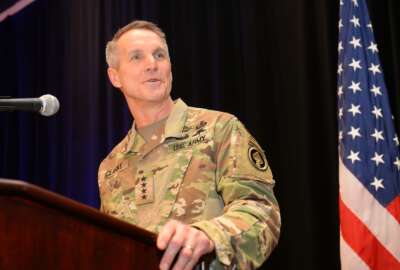To listen to the Federal Newscast on your phone or mobile device, subscribe on PodcastOne or Apple Podcasts. The best listening experience on desktop can be found using Chrome, Firefox or Safari.
- An update to the Interior Department ethics program. Interior Secretary David Bernhardt announced plans to streamline the department’s 13 ethics programs into one. Scott De La Vega, a career employee who currently serves as director of Interior’s Departmental Ethics Office and the designated agency ethics official, will run the operation. Bernhardt said Interior’s 13 ethics programs all had different reporting structures and staffing levels, while some programs operated with no staff members at times. (Department of the Interior)
- The U.S. Court of Appeals has denied the government a chance to immediately enforce President Donald Trump’s workforce executive orders. A three-judge panel said it won’t lift the injunction on the president’s collective bargaining and official time executive orders. U.S. attorneys argued agencies needed to immediately enforce the EOs to speed up ongoing collective bargaining negotiations. The court’s most recent decision is a small win for federal employee unions. The National Treasury Employees Union said it plans to request a rehearing on this case. (Federal News Network)
- A Native American will oversee environmental and health protections for Indian Country. W. Scott Mason IV, a citizen of the Cherokee Nation and fifth-generation Oklahoman, became the new director of the American Indian Environmental Office at the EPA. Mason was vice president and executive director of federal programs at the University of Oklahoma. The EPA office Mason will lead manages a $63 million grant program for tribes to build their own environmental protection and waste disposal programs. (Environmental Protection Agency)
- Two Senators are introducing legislation to end the cooling off period for service members to work at the Defense Department. For more than 50 years, service members leaving the military have had to wait 180 days before joining DoD as a civilian. Proponents of the bill said waiving the waiting period helps DoD recruit needed talent. Opponents said the bill could keep outsiders from working for DoD and bringing in fresh ideas.
- DoD may be doing joint officers a disservice in the way they are being educated and assigned. A new RAND Corporation study said some joint officers are only getting one phase of their joint training before being put on assignment. They then get the second phase at a later date, which RAND said hurts their chances of a promotion. The RAND study stated the officers are judged for promotions on their joint assignments and missing the second phase of education before deployment could hurt their chances. (Federal News Network)
- The Navy and Marine Corps are planning tens of millions of dollars in new spending to beef up their cybersecurity. The services gained approval from Congressional Defense committees to move $96 million from this year’s budget into a program called Comply-to-Connect. The program blocks computing devices from connecting to government networks unless they’re properly configured and up-to-date with security patches. The Marines plan to use the funds to deploy C2C across all of their bases; the Navy is still identifying the products and services it will need to buy for a full rollout. The spending is part of a broader cybersecurity-related budget reprogramming package the Defense Department sent to Capitol Hill for approval earlier this year. (Department of Defense)
- The Department of Health and Human Services, and the Defense Information Systems Agency are thinking beyond usernames and passwords when it comes to network security. The agencies are developing a pilot aimed at using behavior characteristics, including biometrics, to verify the identities of network end-users. HHS Chief Information Officer Jose Arrieta said the concept could be useful for the agency’s first responders. (Federal News Network)
- The Energy Department is updating its cybersecurity capability maturity model to address changes in technology and new threat actors. Energy wants public comment on the revisions to the C2M2, which the department first released in 2014. Version 2 of the cyber capability maturity model incorporates enhancements to align model domains and functional questions with internationally-recognized cyber standards and best practices, including the NIST Cybersecurity Framework Version 1.1. The department said the maturity model can be used by any organization to measure the current level of capability of its practices, processes and methods and set goals and priorities for improvement. Comments are due by Sept. 13. (Federal Register)
- More guidance on artificial intelligence is underway at the National Institute of Standards and Technology. Elham Tabassi, acting chief of staff at NIST’s Information Technology Lab, said in the next few months NIST will seek public comment on its recommendations for confronting adversarial machine learning. Early next year, the agency will also seek feedback on upcoming standards for explainable AI. (Federal News Network)
- Agencies now have guidelines for creating task-order and delivery-order ombudsmen. The Federal Acquisition Regulations Council issued a final rule establishing how agencies should set up these independent arbiters for multiple award contracts over the simplified acquisition threshold. The ombudsman are there to address contractor concerns regarding compliance with task and delivery order award procedures as well as to review contractor complaints regarding task and delivery order contracts. (Federal Register)
Copyright
© 2025 Federal News Network. All rights reserved. This website is not intended for users located within the European Economic Area.


